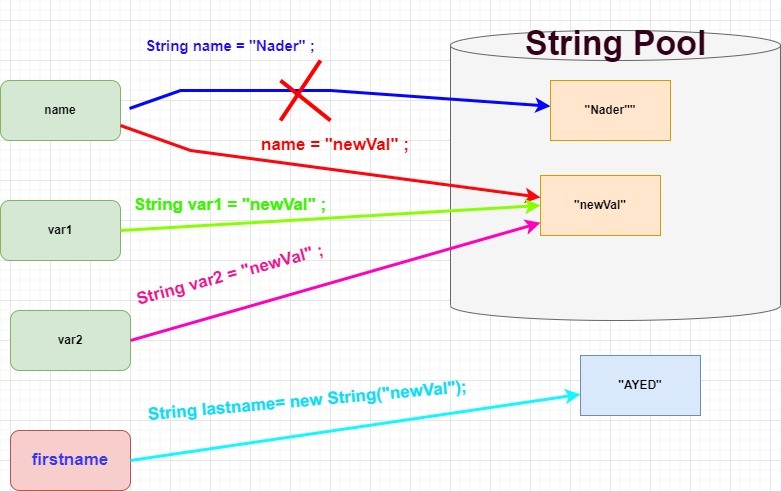What Is Immutable Strings and How It Functions
In the realm of shows, recognizing the principle of immutable strings is critical for developing safe and secure and durable applications. Immutable strings refer to strings that can not be changed after they are produced, ensuring information integrity and predictability within the code. This essential principle plays a crucial function in numerous shows languages and provides an unique method to dealing with information. By checking out the complexities of how immutable strings operate, one can discover a world of benefits and possibilities that can boost the top quality and performance of software growth.
The Fundamentals of Immutable Strings
Immutable strings, as a basic concept in programs, are personality sequences that can not be altered when they are developed. This indicates that once a string is assigned a value, that worth can not be altered. In languages like Python and Java, strings are immutable objects, causing various implications in regards to memory administration and information integrity.
Among the crucial benefits of unalterable strings is that they supply a complacency in information manipulation. Since the material of an immutable string can not be modified, it ensures that the original data continues to be undamaged, lowering the danger of unintentional changes during program execution (Why are strings immutable in Java?). This residential or commercial property additionally streamlines debugging procedures, as designers can rely on that as soon as a string is specified, its value will certainly not be accidentally modified
When a new string is developed based on an existing one, rather than changing the initial string, the brand-new value is saved independently. On the whole, understanding the fundamentals of unalterable strings is essential for understanding shows principles and maximizing code efficiency.
Benefits of Immutable Strings
Structure upon the safety and security and efficiency advantages of unalterable strings, their benefits include boosting code integrity and simplifying concurrent programming tasks. By being immutable, strings can not be modified after creation, which gets rid of the danger of unplanned adjustments in the information they save. This fundamental immutability makes certain that when a string is produced, its value continues to be consistent throughout the program's implementation, reducing the possibilities of insects caused by unforeseen modifications.
In addition, unalterable strings add to code dependability by making it simpler to reason concerning the state of a program. Because strings can not be altered, developers can trust that a string will certainly always hold the same worth, streamlining debugging and maintenance efforts. This predictability leads to extra secure and reliable codebases.

Application in Programming Languages
Within different shows languages, the incorporation of unalterable strings is a basic element that influences exactly how data is handled and adjusted within code frameworks. The implementation of unalterable strings varies throughout various shows languages, with each language using its very own devices to support this principle.

On the other hand, languages like C and C++ do not have built-in support for unalterable strings. Designers in these languages must manually implement immutability by imposing rules within their code to avoid direct modifications to string objects.
Finest Practices for Working With Immutable Strings
When dealing with see post unalterable strings in programming languages like Java and Python, sticking to best methods guarantees safe and secure and reliable information control. Among the crucial ideal methods is to use StringBuilder or StringBuffer as opposed to directly controling strings, particularly when managing considerable concatenation operations. These courses supply mutable alternatives for string adjustment, aiding to stay clear of unnecessary memory allowances and boosting efficiency.
Furthermore, when functioning with sensitive data such as passwords or API secrets, it is vital to avoid storing them as simple message in unalterable strings. Utilizing safe storage space mechanisms like char ranges or specialized collections for handling delicate info aids reduce safety and security threats associated with immutable strings.
Real-world Applications and Instances
Checking out functional implementations of immutable strings in different markets discloses their significant impact on data integrity and system integrity. In the healthcare industry, unalterable strings play an essential duty in making certain the safety and privacy of patient data. By preventing unauthorized adjustments to delicate information such as clinical records and prescriptions, immutable strings help maintain conformity with stringent privacy guidelines like HIPAA.
Banks also profit from the unalterable nature of strings to enhance the safety of client data and purchase records. Unalterable strings assist protect against fraud and unauthorized modifications to economic info, offering a robust protection versus cyber dangers and making certain the count on and confidence of clients.

Verdict
Finest methods for working with immutable strings include avoiding direct modifications and utilizing approaches that return new string objects. Real-world applications of unalterable strings include information security, caching, and string adjustment tasks.
Immutable strings refer to strings that can not be changed after they are created, guaranteeing data stability and predictability within the code. When a brand-new string is created based on an existing one, rather than modifying the original string, the brand-new worth is kept individually.In languages like Java and Python, strings are immutable by default, implying that as soon as a string object is produced, its worth can not be transformed - Why are strings immutable in Java?. Finest techniques for functioning with unalterable strings include avoiding straight adjustments and utilizing methods that return brand-new string things. Real-world applications of unalterable strings consist of data encryption, caching, and string control tasks